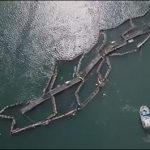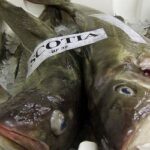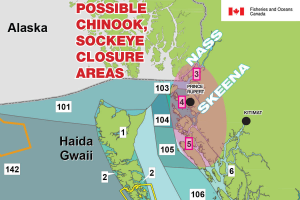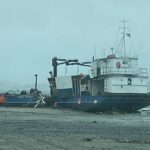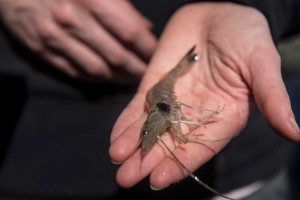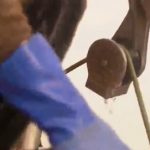Tag Archives: South Shore lobstermen
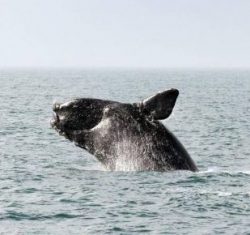
Massachusetts Lobstermen to rally in Plymouth over Cape Cod Bay closures
After a period of bad weather, surveyors of North Atlantic right whales were able to fly on Tuesday over Cape Cod Bay, where the continuing presence of the animals has led state officials to extend seasonal bans on high boating speeds and lobstering through May 14. But commercial lobstermen are beginning to bristle at the closures, citing the impact on their livelihood. South Shore lobstermen are planning a rally Thursday morning in Plymouth to protest the extended ban. “There’s a lot of people that are suffering with this closure,” said rally organizer Sheryl Holmes, whose husband, Roscoe “Stoney” Holmes, is a commercial lobsterman who owns the F/V Haley’s Comet out of Plymouth. >click to read<21:59
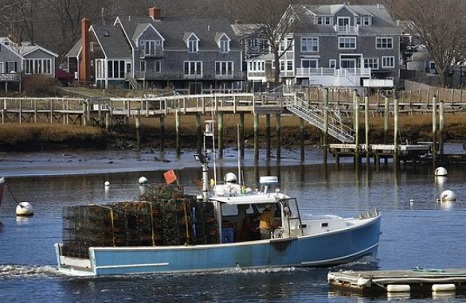
North Atlantic Right Whale: Fishing closure looms over South Shore lobstermen
The annual fishing closure that forces a halt of the lobstering industry each winter is still a month away, but lobstermen are already pulling their traps out of the water and preparing for a long three months of trying to make ends meet. For the last four years, federal regulations have forced lobstermen out of the water from Feb. 1 to April 30, an attempt to lessen the number of North Atlantic right whales that die due to fishing gear entanglements. Not only can the fishermen not be in the water, but they also have to pull all of their traps from the ocean floor before Feb. 1 — as many as 800 per commercial license. >click to read<19:15
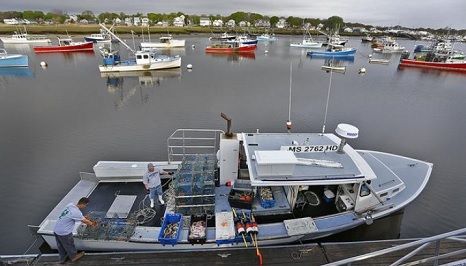
South Shore lobstermen finally put traps in water
South Shore lobstermen are back on the water this week after more than a three month ban on lobster fishing, aimed at protecting endangered whales. The ban was supposed to be from Feb. 1 to April 30, but an additional two weeks was added because whales were spotted close to the shore last month. In all, local lobstermen have gone 15 weeks without pulling a trap or making a sale. “We’re going into the season broke, let’s put it that way,” fisherman Dana Blackman said Wednesday morning, the day after lobster fishing resumed.,, The ban affects about 75 lobster boats in Marshfield and Scituate alone. >click to read<17:46
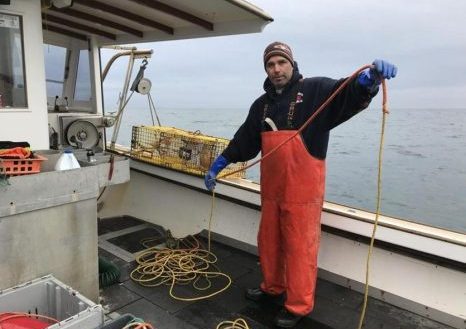
Can anyone save the North Atlantic right whale? A group of South Shore lobstermen say they know what the answer is
By the time Mike Lane shoves off the Cohasset docks, it’s past 8 a.m. — practically lunch time for a lobsterman. But it’s early spring, and the South Shore fisheries are mostly closed, so Lane is keeping a somewhat relaxed schedule. Lobsters tend to hole up for the season several miles farther offshore, and Lane would like to be there, fishing his 800 traps. That area also happens to be a feeding area for North Atlantic right whales — one of our planet’s most endangered species. And so, four years ago, the federal government closed these grounds for much of the winter and spring. That means all Lane can do right now is set a few traps in a small area just outside Cohasset Harbor. >click to read<11:37
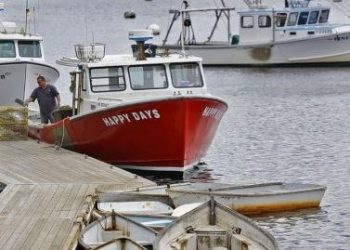
South Shore lobstermen dismayed by failed bid for longer season
Lobstermen are busy loading their boats with traps and buoys and getting their gear back in the water after a three-month closure lifted this week for most of the South Shore. But Marshfield lobsterman John Haviland said he is starting the season feeling more disenchanted than ever after federal regulators turned down a proposal to allow lobstermen to fish year-round with a new rope line designed to reduce the chance of entangling endangered whales. “I’m disappointed that we put three years worth of research and meetings into trying to do the right thing, and it was not successful,” Haviland, president of the South Shore Lobster Fishermen’s Association, said. “It makes you question if you should keep doing the one thing you’ve always done.” Since 2015, federal regulations have banned the use of lobstering equipment from Feb. 1 to April 30 off Cape Cod Bay and beyond, shutting down the local industry for the winter. The goal is to reduce the chances of whales becoming entangled in the gear. click here to read the article 12:09
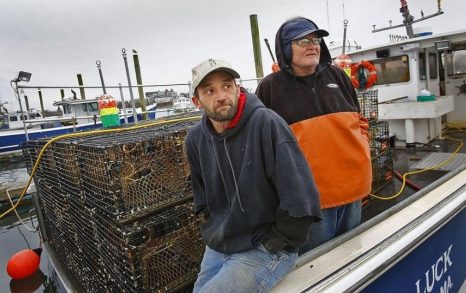
South Shore Lobstermen brace for third year of fishing ban
It’s a classic New England scene, colorful lobster traps stacked up along a dock. But for fishermen in South Shore lobster ports, those grounded traps are a symbol of hard times ahead. Aban that keeps most of their gear out of the water for the winter is entering its third year, despite arguments that it causes them unfair economic hardship. “If it made sense, that would be one thing,” Irvine Nash, a lobsterman for 48 years, said as he stood on a dock in Green Harbor. “But it don’t,” he said. Behind him, fishermen were pulling traps out of the water and loading them on trucks. They will sit empty in yards and garages until May, when the government lifts the ban. Under a recent rule from the National Marine Fisheries Service, all traps from outer Cape Cod to Cape Cod Bay and parts of Massachusetts Bay must be out of the water by Feb. 1. That’s an area just under 3,000 square nautical miles. The federal agency first imposed the ban in 2015, to decrease the likelihood of endangered North Atlantic right whales, which come to Cape Cod Bay every winter, from entangling themselves in lobster lines. Read the story here 08:36
South Shore Lobstermen innovating for Whale closure exemption
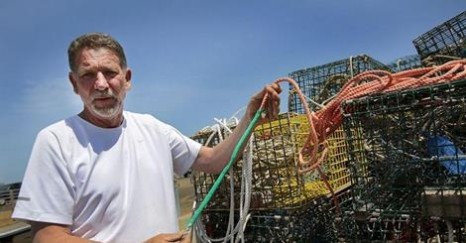 Representatives from local fishermen’s associations may have a solution they hope can lead to an exemption in a federally mandated closure that grounds local fishermen from Feb. 1 to April 30. The closure encompasses nearly 3,000 square nautical miles, including parts of Massachusetts Bay and the waters around Cape Cod. It was first implemented in 2015 and affects fishermen who use vertical lines, such as lobster fishermen. The goal behind the closure is to protect the right whale from possible entanglements. Since before the closure began, the fishermen have been looking for a compromise so they can help protect the endangered species without hurting their livelihoods. The solution that may be the key to an exemption is a type of sleeve local fishermen have been trying out for about two years. Read the story here 15:48
Representatives from local fishermen’s associations may have a solution they hope can lead to an exemption in a federally mandated closure that grounds local fishermen from Feb. 1 to April 30. The closure encompasses nearly 3,000 square nautical miles, including parts of Massachusetts Bay and the waters around Cape Cod. It was first implemented in 2015 and affects fishermen who use vertical lines, such as lobster fishermen. The goal behind the closure is to protect the right whale from possible entanglements. Since before the closure began, the fishermen have been looking for a compromise so they can help protect the endangered species without hurting their livelihoods. The solution that may be the key to an exemption is a type of sleeve local fishermen have been trying out for about two years. Read the story here 15:48

































